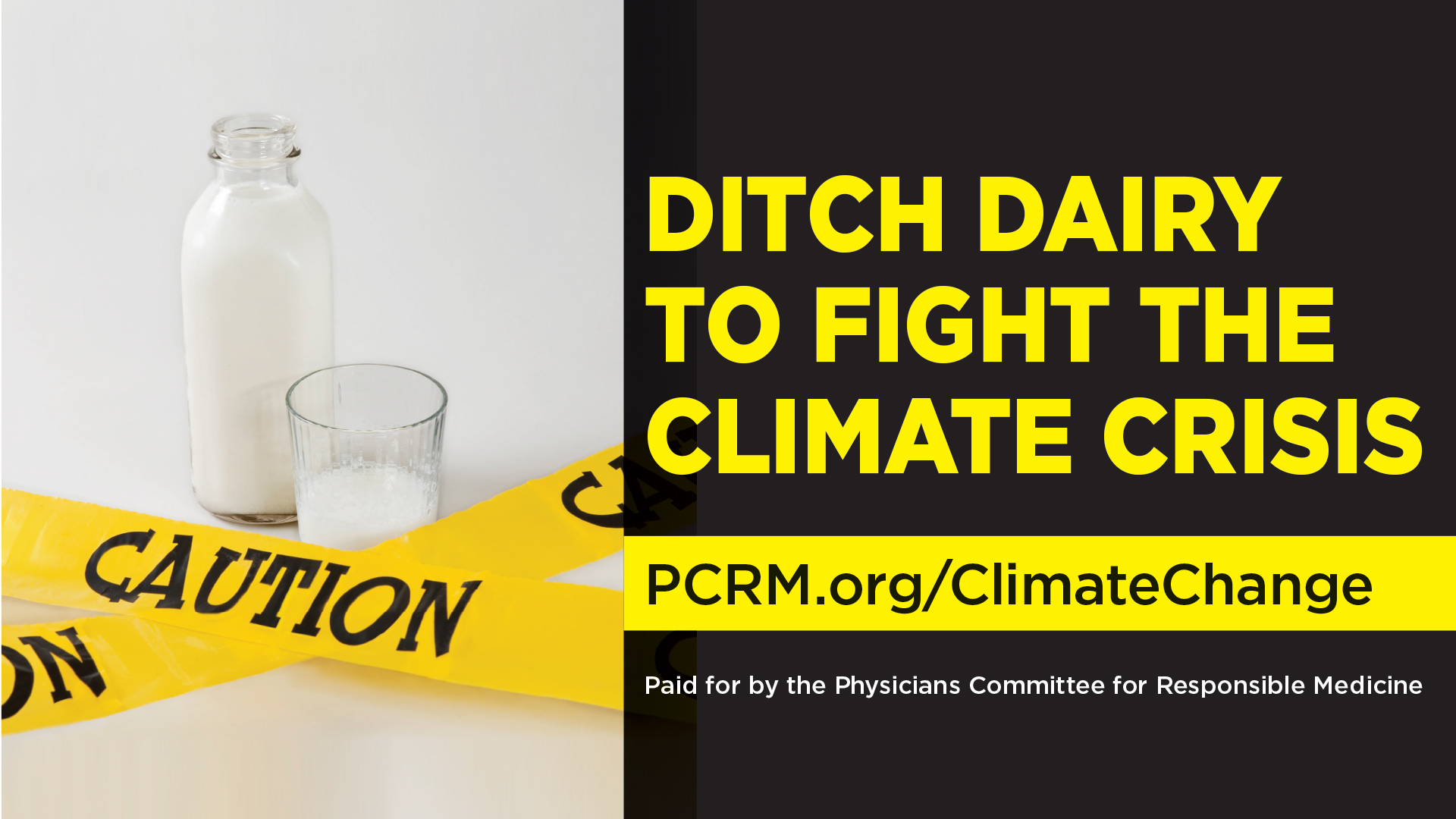‘Ditch Dairy to Fight the Climate Crisis,’ Urges Billboard in Tulare County, Calif.

TULARE, Calif.—A billboard urging people to ditch dairy from their diet to help fight climate change has been posted in Tulare County, Calif., which produces the most milk in the nation. In California, most climate-warming methane emissions from livestock are related to dairy. The Physicians Committee for Responsible Medicine, which is sponsoring the billboard, also wrote to the California Environmental Protection Agency Climate Action Team to ask that it encourage citizens to avoid animal products and adopt a plant-based diet, which research shows is beneficial for the environment and human health.
The billboard, which reads "Ditch Dairy to Fight the Climate Crisis,” directs motorists to PCRM.org/ClimateChange and is scheduled to go up Sept. 18 on Highway 99 .3 miles south of the Tagus exit: https://goo.gl/maps/5zychKuh7Tx3Pi6J7
“California has the dubious distinction of being home to both the cattle feedlot that emits the most climate-warming methane emissions from cow burps in the United States and the feedlot where methane from cow burps was first detected from space,” wrote Anna Herby, DHSc, RD, CDCES, nutrition education specialist for the Physicians Committee for Responsible Medicine, in a letter to the Climate Action Team at the California Environmental Protection Agency. “To help cut methane emissions from animal agriculture that is fueling the climate crisis, I urge the California Environmental Protection Agency Climate Action Team to implement a climate change emission reduction strategy encouraging citizens to avoid animal products and adopt a plant-based diet, which research shows is beneficial for the environment—and for human health, too.”
The Climate Action Team, which includes representatives from the California Department of Public Health and the California Department of Food and Agriculture, is a multiagency team that coordinates California’s statewide climate efforts.
In California, most methane emissions from livestock are related to dairy, according to Assessing California's Climate Policies—Agriculture, a report from the Legislative Analyst's Office. In 2019, 96% of methane emissions from the agricultural sector in California came from dairy and other livestock.
California is the No. 1 milk producer in the United States, according to the California Milk Advisory Board, which says that “currently there are more than 1,100 California dairy farms, housing 1.72 million milk cows.”
“Tulare County is the largest dairy-producing county in the nation. It also has the most milk cows with 450,000,” according to the California Milk Advisory Board.
Cattle produce methane as part of their normal digestive process, called enteric fermentation. When cows burp the methane is released into the atmosphere. Methane is also produced when animal manure is stored or managed in lagoons or holding tanks, according to the Environmental Protection Agency.
Experts say that cutting emissions from methane, which is relatively short-lived but has around 80 times more warming potential than carbon dioxide, is critical in preventing catastrophic climate change.
Reducing livestock herds would reduce emissions of methane, which is the “second largest contributor to global warming after carbon dioxide,” according to the World Health Organization.
A study published last week found that greenhouse gas emissions from agriculture and land use would decline by 31% in 2050 compared to 2020 if globally 50% of animal products, including milk, are substituted with plant-based alternatives.
Shifting diets from animal products to plant-based diets has a high potential for reducing carbon footprints and mitigating climate change, as well as improving human health, according to Climate Change 2022: Mitigation of Climate Change, a report from the United Nations’ Intergovernmental Panel on Climate Change.
Eating a plant-based diet improves human health by reducing the risk of many chronic diseases associated with animal products. Research shows that dairy products including milk increase the risk of breast cancer, prostate cancer, ovarian cancer, asthma, cognitive decline, heart disease, and early death, and offer little if any protection for bone health.
Plant-based diets rich in fruits, vegetables, grains, and beans provide plentiful calcium, potassium, and magnesium. The natural source of vitamin D is sunlight, and fortified cereals, grains, bread, orange juice, and plant milks are dietary options.
Media Contact
Michael Keevican
202-527-7367
mkeevican[at]pcrm.org
Founded in 1985, the Physicians Committee for Responsible Medicine is a nonprofit organization that promotes preventive medicine, conducts clinical research, and encourages higher standards for ethics and effectiveness in education and research.





